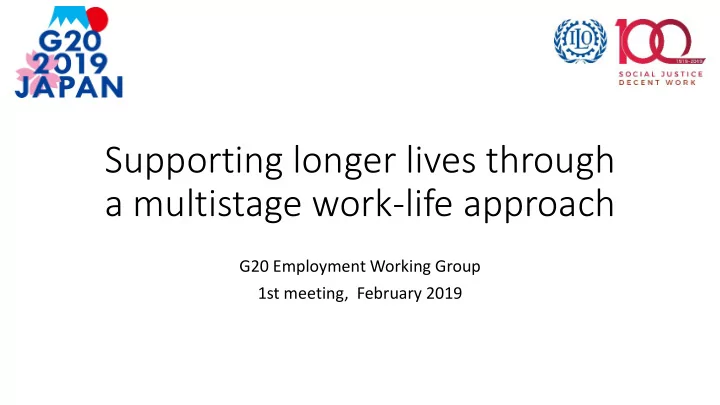

Supporting longer lives through a multistage work-life approach G20 Employment Working Group 1st meeting, February 2019
The labour force is growing older Average age of the labour force, 1990-2030 (projections for 2018 and beyond) 44 42 40 38 36 34 32 1990 1994 1998 2002 2006 2010 2014 2018 2022 2026 2030 World Africa Americas Arab States Asia and the Pacific Europe and Central Asia Source: ILOSTAT, ILO Labour Force Estimates and Projections
Work life patterns are changing Change in labour force participation rates in the G20, by sex and age groups, 1998 and 2018 10 6.9 3.1 5 2 Percentage points 0.2 0 -0.2 -0.5 -1.5 -1.8 -5 -4.6 -6 -10 -15 -15.5 -16.3 -20 15-24 25-34 35-44 45-54 55-64 65+ Age groups Female Male Source: ILOSTAT, ILO Labour Force Estimates and Projections
From a three-stage life to a multistage life Three-stage model age0 age20 age60 Education Work Retirement Multistage life Self- employment Retirement Education Training Volunteer Employment in an organization Mix of paid work Flexible work and unpaid work
From a three-stage life to a multistage life Investing in skills ecosystems Challenges Solutions • Low investments in lifelong • Extension and diversification of learning systems lifelong learning opportunities • Low adult participation in • Respecting different needs at different stages of life training • Financial incentives • Women participate but in a • Governance of training systems narrow skills range • Recognition and certification of all • family responsibilities, work forms of prior learning responsibilities, health, age and cost hinder participation
From a three-stage life to a multistage life Rethinking social protection Challenges Solutions • Low coverage rates • Combine enhanced social insurance mechanisms with • Current systems do not stronger tax-financed provisions systematically provide to ensure universal coverage protection during transitions throughout the life course • Financial sustainability of social • Eliminate obstacles to security continued coverage during • Cost of providing social transitions protection for all • Parental leave, portability of SS • Gender inequalities benefits, extension of SS to non-wage workers
From a three-stage life to a multistage life Focus on other policy areas Challenges Solutions • Negative perceptions and • Financial incentives to hire/keep certain discrimination workers • Strengthen employment services • ALMP target mainly on young • Awareness raising campaigns people and long-term unemployed • Mixed-age teams • Entrepreneurship programmes • Flexible working arrangements and use don’t cover all population of technologies groups • Entrepreneurship programmes to all population groups
Policy building blocks Support transitions and respect people’s preferences and aspirations a universal entitlement to lifelong learning an effective lifelong learning system a guaranteed universal social protection from birth to old age a transformative agenda for gender equality more investment in the institutions, policies and strategies that will support people through transitions
Recommend
More recommend